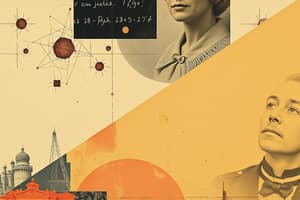Podcast
Questions and Answers
What is a key aspect of staging in drama?
What is a key aspect of staging in drama?
- The use of lighting to create different moods
- The physical arrangement of actors and set pieces on the stage (correct)
- The integration of sound effects and music
- The rehearsal process for actors
Which of the following is NOT a common lighting technique in drama?
Which of the following is NOT a common lighting technique in drama?
- Backlight
- Spotlight
- Cross-light
- Strobe light (correct)
What is the primary purpose of sound design in drama?
What is the primary purpose of sound design in drama?
- To create suspense and evoke emotions (correct)
- To provide lighting cues for actors
- To assist with staging and set design
- To facilitate costume changes during performances
Which of the following is NOT a key component of acting skills in drama?
Which of the following is NOT a key component of acting skills in drama?
What is the central theme explored in the play 'Blood Brothers'?
What is the central theme explored in the play 'Blood Brothers'?
In the context of drama, what is the primary purpose of a tableau?
In the context of drama, what is the primary purpose of a tableau?
What is the primary purpose of makeup and costume design in a theatrical performance?
What is the primary purpose of makeup and costume design in a theatrical performance?
Which of the following is NOT considered a key acting skill?
Which of the following is NOT considered a key acting skill?
Which of the following vocal techniques is NOT typically used by actors?
Which of the following vocal techniques is NOT typically used by actors?
What is the primary focus of character development for actors?
What is the primary focus of character development for actors?
In the production of "Blood Brothers," what is the primary consideration for casting the roles of Mickey, Eddie, and Mrs. Johnstone?
In the production of "Blood Brothers," what is the primary consideration for casting the roles of Mickey, Eddie, and Mrs. Johnstone?
Study Notes
GCSE Drama
GCSE Drama is a course of study that encompasses various aspects of theatre arts, including playwriting, performance, and dramatic theory. This subject provides students with a comprehensive understanding of the art of storytelling through the medium of live action. It offers numerous opportunities for learning and development, both within the classroom setting and beyond.
The following sections will delve into three specific subtopics of GCSE Drama: drama techniques, acting skills, and the production of "Blood Brothers."
Drama Techniques
Drama techniques refer to the methods used by directors, actors, and designers to create engaging and impactful theatrical productions. These techniques can be categorized into several areas, such as:
-
Staging: This involves the physical arrangement of actors, set pieces, and other elements on the stage. Staging techniques can be used to create different moods and atmospheres, such as close-ups, tableaus, or other staging styles.
-
Lighting: Lighting design plays a crucial role in setting the mood and atmosphere of a scene. Different lighting techniques, such as spotlights, backlight, and cross-light, can be used to highlight important elements of a scene and create an emotional response in the audience.
-
Sound: Sound effects, music, and dialogue are all integral components of drama. Sound design can help to enhance the overall storytelling experience, create suspense, or evoke specific emotions.
-
Makeup and Costume: These elements are essential in creating the desired character or setting. Makeup and costume designers work closely with directors, actors, and other members of the production team to create visually appealing and effective costumes.
-
Props: Props are physical objects used in a theatrical performance. They can be used to represent real-world items, such as a phone, or to create a visual metaphor, such as a flower symbolizing love.
Acting Skills
Acting skills are crucial for any individual involved in the performing arts, as they enable actors to portray characters in a convincing and engaging manner. Some of the key acting skills include:
-
Vocal Techniques: Actors need to develop a variety of vocal techniques for different characters, such as accents, volume, pitch, and tone. Vocal exercises and training are essential to improve these skills.
-
Movement and Physicality: Actors must be able to move and use their bodies effectively to convey emotions and actions. This includes physical training, such as dance, martial arts, and gymnastics, as well as studying human movement and gesture.
-
Emotional Expression: Actors need to be able to convey a range of emotions convincingly. This involves understanding and experiencing emotions, as well as learning to express them effectively through facial expressions, tone of voice, and body language.
-
Character Development: Actors must be able to develop a character and make it believable and engaging for the audience. This requires research, analysis, and the ability to connect with the character.
Producing "Blood Brothers"
"Blood Brothers" is a play by Willy Russell that explores the complex nature of social class and family. The play follows the lives of two brothers, Mickey and Eddie, who are separated at birth and brought up in contrasting environments.
To produce a successful production of "Blood Brothers," several key elements must be considered:
-
Casting: The actors chosen for the roles of Mickey, Eddie, and Mrs. Johnstone will significantly impact the overall performance. Directors must ensure that they are casting actors with strong vocal skills, emotional range, and physicality to portray these characters effectively.
-
Design: The design of the production should reflect the themes of the play, such as social class and family dynamics. This includes costumes, lighting, sound, props, and staging.
-
Directorial Vision: The director's vision and interpretation of the script is essential in bringing the production to life. They must work closely with the cast and crew to create a cohesive and engaging performance.
In conclusion, GCSE Drama is an enriching subject that offers students the opportunity to explore various aspects of theatre arts. By focusing on drama techniques, acting skills, and the production of "Blood Brothers," we gain a better understanding of the importance of these elements in creating engaging and impactful performances.
Studying That Suits You
Use AI to generate personalized quizzes and flashcards to suit your learning preferences.
Description
Explore the key aspects of GCSE Drama, including drama techniques, acting skills, and the production of 'Blood Brothers'. Learn about staging, lighting, vocal techniques, emotional expression, character development, casting, design, and directorial vision.




